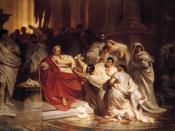Analytical Essay
Julius Caesar
Power is a theme that has dominated mankind since history was recorded. The assassination of Julius Caesar, ruler of the greatest empire the world has ever known, was a result of such a struggle for power. The foundations of Shakespeare's 'Julius Caesar' are power relationships which dominate the liaisons between characters of opposing sex, classes, and ambitions. Even in the historical context, Rome in 44 BC, the height of the Roman Republic, predisposes the play to a complex tangle of power conflicts. As the power of prominent characters builds tension, ambitions develops, and thus manipulation arises. Struggles of authority and dominance are evident between the characters in 'Julius Caesar', through Shakespeare's adept manoeuvring of the language of power, ambition, and manipulation.
The historical circumstances of Rome predispose the play to struggles for power. In 44 BC, Rome had endured 100 years of civil war between the patrician families and generals at the head of the armed forces, a dispute which foreshadows the antagonism that would emerge between the two groups in Shakespeare's play.
Pompey, Caesar's rival to the throne, has just been vanquished in a bloody war, and the patrician families now resent Caesar, the 'first man in Rome', for his new-found supremacy. It is from these tense conditions that the characters are virtually set-up to develop contests for power in various relationships, whether it is with the masses, with their wives, or with each other.
Throughout the entire play, power is a theme of focal importance, and it is revealed as prominent from the start. In the first line of the first scene, power becomes central to the relationship between characters, with Flavius ordering the crowd to flee to their homes, insulting them as 'idle creatures'. The use of insulting and imperative sentences by...


